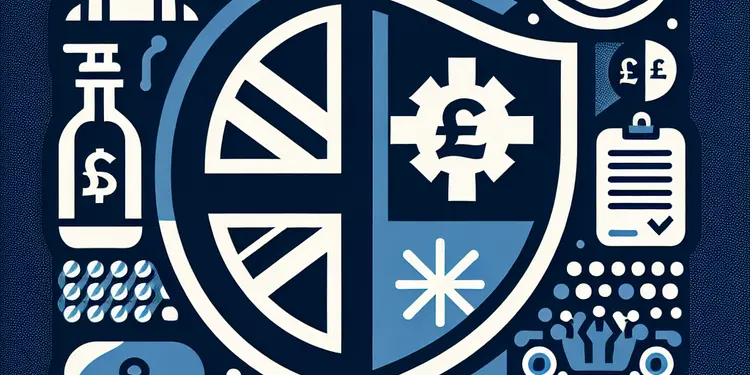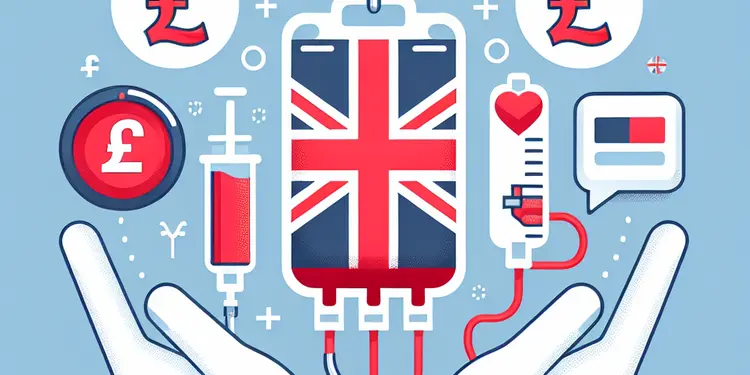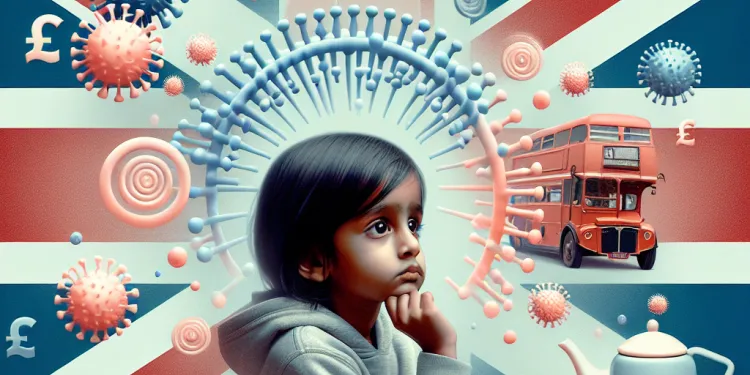
Find Help
More Items From Ergsy search
-
What is a COVID-19 variant?
Relevance: 100%
-
What is the Covid-19 Stratus variant?
Relevance: 96%
-
How are COVID-19 variants detected?
Relevance: 95%
-
How do COVID-19 variants arise?
Relevance: 95%
-
Do new variants affect COVID-19 testing?
Relevance: 93%
-
Where can I learn about real Covid-19 variants?
Relevance: 89%
-

How do scientists name new Covid-19 variants?
Relevance: 88%
-

Do vaccines work against new COVID-19 variants?
Relevance: 86%
-
How often do new COVID-19 variants emerge?
Relevance: 86%
-
What is the process to identify a new Covid-19 variant?
Relevance: 86%
-

How can I protect myself from new COVID-19 variants?
Relevance: 85%
-

Are new COVID-19 variants more dangerous?
Relevance: 84%
-

How can I protect myself from Covid-19 variants?
Relevance: 83%
-

Should I get vaccinated if I already had COVID-19?
Relevance: 76%
-

What sources should I consult for information on Covid-19?
Relevance: 74%
-
Does the flu vaccine protect against COVID-19?
Relevance: 71%
-
Can the COVID jab give me COVID-19?
Relevance: 69%
-

Will getting the flu jab protect me against COVID-19?
Relevance: 67%
-

Can COVID-19 be transmitted through blood transfusions?
Relevance: 66%
-
Does travel insurance cover COVID-19 related issues?
Relevance: 64%
-
What are the COVID-19 travel restrictions for traveling to Spain?
Relevance: 64%
-
Can air physiotherapy help with COVID-19 recovery?
Relevance: 62%
-

Breathlessness after COVID-19 - helpful techniques
Relevance: 62%
-

Are children more affected by new variants of COVID?
Relevance: 59%
-

What are the Nimbus and Stratus variants of Covid?
Relevance: 59%
-
New Covid Variant Strains
Relevance: 57%
-

Can new variants cause reinfection?
Relevance: 57%
-

Are new variants more transmissible?
Relevance: 56%
-

Is there concern about new hypothetical variants like Nimbus and Stratus?
Relevance: 52%
-

Is the Nimbus variant more contagious?
Relevance: 47%
-

What would happen if the Nimbus variant existed?
Relevance: 46%
-
What are some well-known COVID-19 variants?
Relevance: 45%
-
Are the symptoms different with new COVID-19 variants?
Relevance: 45%
-

Should I be worried about new variants?
Relevance: 43%
-

Do vaccines protect against the Stratus variant?
Relevance: 43%
-
What is being done globally to track COVID-19 variants?
Relevance: 42%
-

How long does immunity last after getting the COVID jab?
Relevance: 41%
-
Can current treatments handle new COVID-19 variants?
Relevance: 39%
-

Are COVID jabs safe?
Relevance: 39%
-
How do COVID jabs work?
Relevance: 39%
Understanding COVID-19 Variants
The term "COVID-19 variants" refers to the different strains of the SARS-CoV-2 virus, which causes the illness known as COVID-19. These variants emerge due to mutations in the virus's genetic material. As the virus replicates, small errors or changes in its genome can occur, leading to new variants. These mutations can affect the virus in various ways, including its transmissibility, severity of illness, and effectiveness of vaccines against it.
How Variants Arise
Viruses, including SARS-CoV-2, constantly evolve through mutations as they spread from person to person. Most mutations have little or no impact on the virus's properties. However, some mutations can provide the virus with advantages, such as increased transmissibility or the ability to evade the immune system. When a virus accumulates one or more of these advantageous mutations, it can lead to the emergence of a new variant.
Different COVID-19 Variants
The World Health Organization (WHO) and national health organizations closely monitor and classify new variants. Some variants are categorized as "Variants of Concern" (VOC) if they appear to increase transmissibility, lead to more severe disease, reduce the effectiveness of public health measures, or impact diagnostics, treatments, and vaccines. Notable variants observed include the Alpha, Beta, Gamma, Delta, and Omicron variants, each named using the Greek alphabet to avoid stigmatization associated with geographic naming.
Impact of Variants on Public Health
COVID-19 variants can affect public health responses and measures. For instance, some variants may spread more easily than others, leading to higher infection rates. Increases in transmission can result in more cases, hospitalizations, and potential strain on healthcare systems. Additionally, certain variants may show resistance to vaccines, though vaccines approved in the UK continue to offer strong protection against severe illness and death. Ongoing monitoring and research are crucial to understanding and adapting to these variants.
Vaccines and Variants
The development and rollout of vaccines have been a pivotal part of the global strategy to combat COVID-19. While some variants may partially evade immune protection, studies show that vaccines remain effective at preventing severe illness and hospitalizations. In the UK, booster doses are recommended to enhance and extend the protection against emerging variants. The ability of vaccines to adapt to mutations through updated formulations is also a key aspect of the ongoing response to COVID-19.
Conclusion
In summary, COVID-19 variants are a natural part of the virus's evolution. Understanding their characteristics and impacts on transmission, immunity, and vaccine effectiveness is essential. Continuous monitoring and vaccination efforts remain crucial components of the strategy to manage and eventually end the COVID-19 pandemic. Staying informed and complying with health advisories can help protect individuals and communities from the effects of these variants.
Understanding COVID-19 Variants
"COVID-19 variants" are different versions of the virus that causes COVID-19. The virus is called SARS-CoV-2. Variants happen because the virus changes a little bit over time. These changes are called mutations. Mutations can make the virus spread more easily, change how sick people get, or affect how well vaccines work.
How Variants Arise
Viruses change as they move from person to person. Most changes do not affect how the virus acts. But sometimes, changes can make the virus spread faster or hide from the body’s defenses. These new versions of the virus are called variants.
Different COVID-19 Variants
Health groups like the World Health Organization (WHO) watch new variants closely. Some variants are called "Variants of Concern" because they may spread faster or make people sicker. These variants also might affect how well tests, treatments, or vaccines work. Variants like Alpha, Beta, Gamma, Delta, and Omicron are named with Greek letters.
Impact of Variants on Public Health
COVID-19 variants can change how we deal with the virus. Some variants spread more easily, which can mean more people get sick. This can overwhelm hospitals. Some variants might be harder for vaccines to fight off. But vaccines in the UK still protect you well against serious illness and death. Scientists keep studying these variants closely.
Vaccines and Variants
Vaccines help fight COVID-19. Some variants might make vaccines less effective, but vaccines still stop many people from getting seriously ill. In the UK, booster shots help keep vaccine protection strong. Vaccines can be updated to work better against new variants.
Conclusion
COVID-19 variants are a normal part of how viruses change. It's important to know how they spread and how vaccines work against them. Watching for new variants and getting vaccinated are key to ending the pandemic. Following health advice helps keep everyone safe.
Frequently Asked Questions
What is a COVID-19 variant?
A COVID-19 variant is a version of the SARS-CoV-2 virus that has undergone mutations in its genetic code.
How do COVID-19 variants arise?
Variants arise when the virus replicates, and mutations occur in its genetic material, sometimes leading to changes in its characteristics.
Why are some variants more concerning than others?
Some variants may spread more easily, cause more severe illness, or evade immunity from previous infection or vaccination, making them more concerning.
How are variants classified?
Variants are classified based on their potential impact on public health, such as Variants of Interest (VOI), Variants of Concern (VOC), and Variants of High Consequence (VOHC).
What is a Variant of Concern (VOC)?
A Variant of Concern is a variant that has evidence of an increase in transmissibility, more severe disease, or significant reduction in the effectiveness of public health measures, vaccines, or treatments.
How are COVID-19 variants detected?
Variants are detected through genomic sequencing, which analyzes the genetic material of the virus to identify mutations.
Do vaccines work against COVID-19 variants?
Vaccines are generally effective against many variants, particularly in preventing severe illness, although some variants may partially reduce their effectiveness.
Can a person get reinfected with a different variant?
Yes, it is possible to get reinfected with a different variant, although prior infection may provide some immunity.
Why is tracking variants important?
Tracking variants helps public health officials understand how the virus is evolving and inform response strategies, including vaccine updates and public health measures.
Is the Delta variant more severe than other variants?
The Delta variant is known for increased transmissibility and may cause more severe disease, leading to more hospitalizations compared to previous variants.
What are the names of some common variants?
Common variants include Alpha, Beta, Gamma, Delta, and Omicron, which have been identified and named by the World Health Organization.
How do variants affect testing for COVID-19?
Most COVID-19 tests remain effective against variants, but continuous monitoring is necessary to ensure tests accurately detect new variants.
Can new variants affect the accuracy of COVID-19 tests?
While most tests remain accurate, there is a potential for decreased accuracy if mutations affect the genomic regions targeted by the tests.
Where do COVID-19 variants typically occur?
Variants can occur anywhere in the world where the virus is circulating heavily, as more infections increase the chance of mutations.
Can travel contribute to the spread of variants?
Yes, international travel can contribute to the spread of variants as people move between regions, potentially spreading new versions of the virus.
What role do public health measures play in controlling variants?
Measures like vaccination, mask-wearing, and social distancing help control the spread of all variants by reducing overall virus transmission.
How do mutations affect the virus?
Mutations can affect the virus's transmissibility, ability to evade immunity, and potential to cause severe disease. Some mutations may have no significant effect.
What is the Omicron variant known for?
The Omicron variant is notable for having many mutations, particularly in the spike protein, which may affect transmissibility and immune escape.
How can individuals help reduce the emergence of new variants?
By getting vaccinated, following public health recommendations, and preventing the spread of the virus, individuals can help reduce opportunities for the virus to mutate.
What is the impact of variants on pandemic preparedness?
Variants impact pandemic preparedness by requiring ongoing adaptation of vaccines, treatments, and public health responses to effectively control the spread of COVID-19.
What is a COVID-19 variant?
COVID-19 is a virus that can change. When it changes, we call it a "variant." Variants are like different versions of the virus.
Just like how there are different types of dogs, like poodles and bulldogs, there are different types of the COVID-19 virus.
Scientists watch these variants to see if they make people more sick or spread faster.
If you find reading hard, you can ask someone to help you or use a tool that reads the text out loud.
A COVID-19 variant is a new type of the virus that causes COVID-19. It happens when tiny changes (called mutations) happen in the virus's instructions (its genetic code).
How do new types of COVID-19 happen?
COVID-19 is a virus. Sometimes, it changes a little bit. These changes can make new types of the virus. This is normal for viruses. It happens when the virus copies itself.
Use pictures and videos to help learn more. Ask someone to explain if it is hard to understand.
Variants happen when a virus makes copies of itself. Sometimes, small changes or mistakes happen in its genes. This can change what the virus is like.
Why are some virus types more worrying than others?
Some virus types are more worrying because they can spread faster. They might also make people sicker.
Sometimes, these virus types can change so the medicine or vaccine doesn't work as well. This makes it harder to stop people from getting sick.
Tools to help understand:
- Use pictures to show how viruses spread.
- Watch videos that explain how viruses change.
- Ask an adult or teacher if you have questions.
Some new types of a virus can spread faster. They might make people sicker or be harder to protect against, even if you've had the sickness before or a vaccine. This makes these types more worrying.
How do we sort different types?
We put things into groups to make it easier to understand them. You can think of it like sorting toys into different bins. We look at things like size, shape, and color.
To help understand, you can use pictures or work with a friend or teacher. These tools can make it easier to learn.
Variants are grouped by how they might affect people's health. There are three groups: Variants of Interest, Variants of Concern, and Variants of High Consequence.
What is a Variant of Concern? (VOC)
A "Variant of Concern" is a type of virus that can spread more easily or make people sicker.
Scientists watch these viruses closely. They look for changes that might make the virus more dangerous.
When scientists find a new variant that spreads faster or causes more serious illness, they call it a Variant of Concern.
Helpful Tips:
- Use simple words to learn about new topics.
- Ask questions if you don't understand something.
- Look at videos or pictures to help explain new ideas.
A Variant of Concern is a type of virus that spreads more easily, makes people sicker, or makes vaccines and treatments work less well.
How do we find different types of COVID-19?
Scientists look for changes in the virus to find different types of COVID-19.
They take samples of the virus from people. Then, they study its genes with special tools.
These tools help them see if the virus has changed. This is how they find new types of the virus.
You can use pictures and videos to help you understand this better.
We find changes in the virus by looking at its genetic code. This is called genomic sequencing. It helps us see any differences or mutations.
Do Vaccines Help with New COVID-19 Types?
Vaccines are made to help stop sickness. COVID-19 has different types, called variants. Vaccines can still help protect against these new types, but people may need extra shots to stay protected.
To understand better, talk to doctors or look at trusted websites. Pictures, videos, or simple summaries can also help.
Shots to stop you from getting sick work well for many different germs. They help keep you from getting really sick. But some new germs might make the shots not work as well.
Can you get sick again from a new type of the same virus?
Yes, it is possible to get sick again from another type of the same virus. Viruses can change, and these new types are called variants. Your body may not be able to stop the new type because it is different.
Here are some tips to help you understand:
- Ask many questions: If you do not understand, it is okay to ask someone for help.
- Use pictures: Draw or find pictures that help explain the virus and how it changes.
- Talk to a helper: Speaking with a doctor or a teacher can help you understand more.
Yes, you can catch a different version of the virus again, but having it before might help you fight it off better.
Why is it important to watch changes in viruses?
Sometimes viruses change. These changes are called 'variants'. By watching variants, scientists can:
- See if the virus is spreading more.
- Check if it makes people more sick.
- Make sure medicine and vaccines still work.
To help understand, you can:
- Use pictures and videos that explain it.
- Ask someone to explain it to you.
- Write notes or draw to remember it better.
Watching how the virus changes helps doctors and health workers know what to do next. This helps them make better vaccines and rules to keep people safe.
Is the Delta variant worse than other types?
The Delta variant is another type of COVID-19 virus.
Scientists look at how sick people get with each type.
Some people think Delta might make people sicker than other types.
It spreads easily, so lots of people have caught it.
Helpful Tips:
- Ask a doctor if you feel unwell.
- Wear a mask to stop the spread.
- Get a vaccine if you can.
- Read simple news or watch videos to learn more.
The Delta variant spreads more easily. It can make people sicker, which means more people might need to go to the hospital.
What are some common types called?
There are different types of the virus with names. These are Alpha, Beta, Gamma, Delta, and Omicron. The World Health Organization gave them these names.
How do new kinds of the COVID-19 virus change testing?
Testing helps us know if someone has COVID-19. Viruses can change and become new kinds, called variants. Sometimes, these new kinds can make testing hard. Tests might not work as well if the virus changes a lot. Scientists work hard to make better tests for new virus kinds. Tools like pictures, videos, or talking to someone can help understand this better.Most COVID-19 tests still work well for different types of the virus. But scientists need to keep checking to make sure tests find any new virus types.
Do new versions of the COVID-19 virus make tests less accurate?
New versions of the COVID-19 virus are called "variants".
Tests are used to find out if someone has the virus. Sometimes, new variants can change how well these tests work. This means the test might not be as good at finding the virus.
If you need help understanding tests, you can try these things:
- Ask a doctor or nurse to explain the tests.
- Use simple online videos that show how tests work.
- Look at pictures or drawings that explain testing steps.
These can help you understand better how the virus and tests work.
Most tests work well. But sometimes, changes in the virus can make tests less accurate. This happens if the virus changes where the test looks.
Where do COVID-19 changes usually happen?
Viruses like COVID-19 change over time. These changes are called "variants." Variants happen when the virus makes copies of itself inside people. It is important to know where and how these changes happen.
Helpful Tip: You can learn more about COVID-19 by using videos or talking to a doctor. Videos and pictures can make it easier to understand.
New types of the virus can happen wherever the virus is spreading a lot. More people getting infected gives the virus a chance to change.
Can travel help spread different virus types?
When people travel, they might carry germs and viruses to new places.
This can help the virus spread and change.
Simple steps to stay safe:
- Wash your hands often.
- Wear a mask in crowded places.
- Keep a safe distance from others.
- Get a vaccine if you can.
Yes, traveling to other countries can help spread the virus. When people go from one place to another, they might take new types of the virus with them.
How do public health rules help stop new virus types?
Getting vaccines, wearing masks, and staying apart from other people help stop the virus from spreading. This keeps everyone safer from all types of the virus.
What happens when the virus changes?
Sometimes viruses change. These changes are called mutations.
When a virus changes, it can act in new ways. It might make people sick in a different way, or it might spread more easily. Scientists study these changes to help keep people safe.
Some helpful things you can use are pictures, videos, or talking to a person you trust. These can help you understand better.
Changes in the virus, called mutations, can do different things. They might make the virus spread easier, hide from our body's defenses, or make people sicker. But sometimes, changes do not do much at all.
Using pictures or diagrams can help understand how the virus changes.
What is Omicron?
Omicron is a type of virus that makes people sick. It's a part of the COVID-19 family. It spreads quickly between people.
You can stay safe by washing your hands, wearing a mask, and getting a vaccine. These things help stop the virus.
The Omicron variant is special because it has a lot of changes, especially in the spike protein. This might make it spread more easily and hide from our immune system.
How can people help stop new virus versions from appearing?
Here's how you can help:
- Wash your hands: Clean your hands often with soap and water.
- Wear masks: Use a mask over your nose and mouth in crowded places.
- Get vaccinated: Vaccines make you stronger against the virus.
- Keep distance: Stay a safe distance from others who are coughing or sneezing.
- Stay informed: Listen to health experts for the latest advice.
- Support tools: Use apps or reminders to help keep track of safe habits.
Get your vaccine. Listen to health experts. Stop the virus from spreading. This helps stop the virus from changing.
How do different virus changes affect how we get ready for pandemics?
Variants affect how we get ready for pandemics. This means we need to keep changing vaccines, medicines, and health plans to stop COVID-19 from spreading.
Here are some tips to help understand better:
- Use tools like text-to-speech to listen to the text.
- Highlight difficult words and look them up or ask someone for help.
- Break down the text into smaller parts and read slowly.
- Use pictures or diagrams to help explain ideas.
Useful Links
This website offers general information and is not a substitute for professional advice.
Always seek guidance from qualified professionals.
If you have any medical concerns or need urgent help, contact a healthcare professional or emergency services immediately.
Some of this content was generated with AI assistance. We’ve done our best to keep it accurate, helpful, and human-friendly.
- Ergsy carfully checks the information in the videos we provide here.
- Videos shown by Youtube after a video has completed, have NOT been reviewed by ERGSY.
- To view, click the arrow in centre of video.
- Most of the videos you find here will have subtitles and/or closed captions available.
- You may need to turn these on, and choose your preferred language.
- Go to the video you'd like to watch.
- If closed captions (CC) are available, settings will be visible on the bottom right of the video player.
- To turn on Captions, click settings .
- To turn off Captions, click settings again.
More Items From Ergsy search
-
What is a COVID-19 variant?
Relevance: 100%
-
What is the Covid-19 Stratus variant?
Relevance: 96%
-
How are COVID-19 variants detected?
Relevance: 95%
-
How do COVID-19 variants arise?
Relevance: 95%
-
Do new variants affect COVID-19 testing?
Relevance: 93%
-
Where can I learn about real Covid-19 variants?
Relevance: 89%
-

How do scientists name new Covid-19 variants?
Relevance: 88%
-

Do vaccines work against new COVID-19 variants?
Relevance: 86%
-
How often do new COVID-19 variants emerge?
Relevance: 86%
-
What is the process to identify a new Covid-19 variant?
Relevance: 86%
-

How can I protect myself from new COVID-19 variants?
Relevance: 85%
-

Are new COVID-19 variants more dangerous?
Relevance: 84%
-

How can I protect myself from Covid-19 variants?
Relevance: 83%
-

Should I get vaccinated if I already had COVID-19?
Relevance: 76%
-

What sources should I consult for information on Covid-19?
Relevance: 74%
-
Does the flu vaccine protect against COVID-19?
Relevance: 71%
-
Can the COVID jab give me COVID-19?
Relevance: 69%
-

Will getting the flu jab protect me against COVID-19?
Relevance: 67%
-

Can COVID-19 be transmitted through blood transfusions?
Relevance: 66%
-
Does travel insurance cover COVID-19 related issues?
Relevance: 64%
-
What are the COVID-19 travel restrictions for traveling to Spain?
Relevance: 64%
-
Can air physiotherapy help with COVID-19 recovery?
Relevance: 62%
-

Breathlessness after COVID-19 - helpful techniques
Relevance: 62%
-

Are children more affected by new variants of COVID?
Relevance: 59%
-

What are the Nimbus and Stratus variants of Covid?
Relevance: 59%
-
New Covid Variant Strains
Relevance: 57%
-

Can new variants cause reinfection?
Relevance: 57%
-

Are new variants more transmissible?
Relevance: 56%
-

Is there concern about new hypothetical variants like Nimbus and Stratus?
Relevance: 52%
-

Is the Nimbus variant more contagious?
Relevance: 47%
-

What would happen if the Nimbus variant existed?
Relevance: 46%
-
What are some well-known COVID-19 variants?
Relevance: 45%
-
Are the symptoms different with new COVID-19 variants?
Relevance: 45%
-

Should I be worried about new variants?
Relevance: 43%
-

Do vaccines protect against the Stratus variant?
Relevance: 43%
-
What is being done globally to track COVID-19 variants?
Relevance: 42%
-

How long does immunity last after getting the COVID jab?
Relevance: 41%
-
Can current treatments handle new COVID-19 variants?
Relevance: 39%
-

Are COVID jabs safe?
Relevance: 39%
-
How do COVID jabs work?
Relevance: 39%


